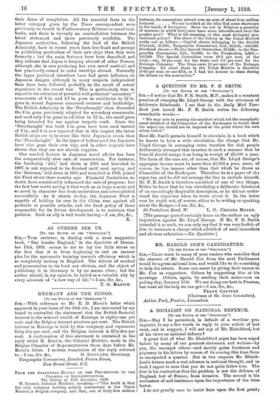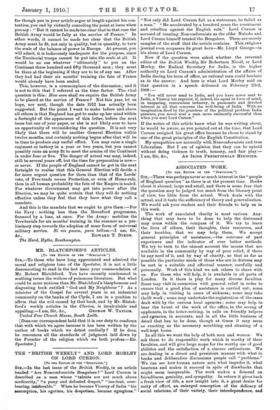A SOCIALTST ON NATIONAL DEFENCE,
[To THE ED/TOR OF THZ SPECTATOR:1
Sin„—May I be permitted, in default of a worthier pro. tagonist, to say a few words in reply to your article of last week, and in support, I will not say of Mr. Blatchford, but of his views on national defence P A great deal of what Mr. Blatchford urges has been urged before by many of our greatest statesmen and writers—by you, Sir, amongst others—and merely gains freshness and piquancy in his letters by reason of its coming this time from so unexpected a quarter. But in two respects Mr. Blatch- ford's letters mark a real advance in national thought, and in both I regret to note that you do not quite follow him. The first is his contention that the problem is not the defence of England, but of France, from invasion. The second is his realisation of and insistence upon the importance of the time factor.
I do not greatly care to insist here upon the first point; for though you in your article argue at length against his con- tention, you end by virtually conceding the point at issue when you say : " But it cannot be made too clear that in that case the British Army would be fully at the service of France." In other words, it cannot be made too clear that the British Army must be fit, not only in quality, but in quantity, to turn the scale of the balance of power in Europe. At present, you will admit, it is ludicrously inadequate for the purpose, since the Territorial troops cannot be put into the scale at all. It would be no use whatever " ultimately " to put on the Continent three hundred and fifty thousand men ; they must be there at the beginning if they are to be of any use. After they had bad their six months' training the fate of France would already have been sealed.
This, however, is a commonplace of the discussion; and it is not to this that I referred as the time factor. The vital question is this : How soon shall we require the British Army to be placed at the service of France P Not this year, let us hope, nor next, though the date 1912 has actually been suggested. But. the point I want to make before and above all others is that England has got to make up her mind within a fortnight of the appearance of this letter, before the next issue but one of your paper, or she is not likely ever to have an opportunity of reconsidering the question. It is not very likely that there will be another General Election within twelve months, and certainly nothing begun after that will be in time to produce any useful effect. You may raise a single regiment or battery in a year or two years, but you cannot possibly raise an army fit to meet the armies of the Continent in under four or five. The danger of actual war may, indeed, still be several years off, but the time for preparation is now— or never. If the people of England cannot be got in the next fortnight to realise that this General Election will decide a far more urgent question for them than that of the Lords' veto, of Free-trade versus Protection, or even of Home-rule, then in all human probability the fate of the Empire is sealed. For whatever Government may get into power after the Election, we may be quite certain that they will do nothing effective unless they feel that they have what they call a mandate.
And this is the mandate that we ought to give them :—For the Navy : nothing less than the Beresford programme, financed by a loan, at once. For the Army : mobilise the Territorials for six months' training in the summer as a pre- liminary step towards the adoption of some form of universal military service. Si roil pacem, para bellum.—I am, Sir,















































 Previous page
Previous page